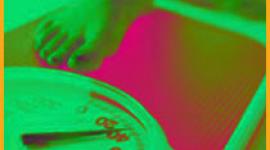Recovery from Food Addiction, Food Cravings

![]()
Our guest, Debbie Danokwsi has battled with an eating disorder for most of her life. She is addicted to food. Debbie tried many different ways to lose weight. She hid food, tried diet pills and diets, but couldn't stick to a diet. Finally, Debbie faced her food addiction and the feelings of being ashamed and lonely. At one point in her life, she says: "I hated myself. I had no self -esteem. I was ashamed of myself for having no willpower." To ease the pain, Debbie says "I even thought about killing myself."
Today, she weighs 150 pounds, down from over 300, and has maintained that weight for over ten years. Read about her addiction to sugar and flour (her trigger foods), and how her attraction to food, coupled with low self-esteem and depression, led to her life as a food addict. Then Debbie outlines the steps that brought her to overcoming food addiction and recovery from food addiction.
David Roberts is the HealthyPlace.com moderator.
The people in blue are audience members.
David: Good Evening. I'm David Roberts. I'm the moderator for tonight's conference. I want to welcome everyone to HealthyPlace.com. Our topic tonight is "Food Addiction, Food Cravings." Our guest is Debbie Danowski, a recovering food addict and author of Why Can't I Stop Eating? Recognizing, Understanding and Overcoming Food Addiction. She has maintained a weight loss of 150 pounds for more than ten years. A nationally renowned speaker, she is an instructor of media studies at Sacred Heart University in Fairfield, CT.
Good evening, Debbie and welcome to HealthyPlace.com. We appreciate you being our guest tonight. Can you describe for us your life as a food addict?
Debbie Danowski: Hello everyone it's great to be here. Being a food addict is similar to being an alcoholic: everything revolves around the substance and life is miserable. Nothing matters except getting food.
David: What were the reasons behind your food addiction?
Debbie Danowski: The reasons are a physical and emotional addiction to sugar and flour that is passed down in families. For instance, both of my grandfathers were alcoholics but I turned to food instead.
David: At what age did you begin to develop an addiction / attraction to food?
Debbie Danowski: I believe that I was born a food addict. Food was always so important to me. I really began to eat after I turned five. I weighed over 300 pounds when I was in my late teens.
David: And you are how old now?
Debbie Danowski: I am 35.
David: Did you suffer from depression or some other psychological disorder that lead to the food addiction?
Debbie Danowski: I believe that the depression was a result of the food addiction. Sugar and flour are depressants in the same way that alcohol is. Once I got these substances out of my body, I did not have the awful depression that I lived with for years. It was a depression that made it almost impossible to get out of bed each day.
David: Could you be specific about the impact that food had in your life before you started recovery?
Debbie Danowski: Food was my life. I spent each and every minute thinking about how I could get food (look under binge eating disorder, compulsive overeating). To get food, I did things I normally wouldn't have. I stole. I lied. I hid food. It was as if I couldn't help myself no matter how hard I tried. At my weight, it was difficult to move and my whole body ached. I isolated and had no life. It was me, my food and television. At the time, I didn't realize just how ashamed and lonely I really was.
David: I'm assuming that having these food cravings affected your self-esteem.
Debbie Danowski: Yes, so very much. I hated myself for being weak and having no willpower. I spent a lot of time being ashamed of myself.
David: Did you try various diets, diet pills, etc.? (dangers of dieting)
Debbie Danowski: Yes, I tried just about everything and each time that I did I hated myself even more for being unable to do anything. I couldn't even stick to a diet for a few hours in the end. I did try over-the-counter diet pills but luckily Phen-Fen and Redux were not available at the time or I could have been one of the people harmed before they were recalled.
I would have done anything, including risking my life to lose weight. I often wished that I would get sick so that I would have a way to lose weight because nothing else worked. What I didn't know is that these diets were setting me up to fail because many of the products had sugar and/or flour in them which just made me want more and more.
David: Besides the food, did you ever turn to alcohol or other substances to ease the pain?
Debbie Danowski: I did drink a little but I only liked the drinks with lots of whipped cream. I also used shopping as a way to ease the pain. I thought that if I could buy the prettiest clothes no one would notice my size 52 body or make fun of me.
|
|
David: What developed that made you want to change and actually follow through?
Debbie Danowski: I was at the point that I was either going to get better or I was going to die. It was an incredible amount of pain that made me want to change. I couldn't bring myself to end my life but I couldn't continue the way that I was. It was the misery that made me work so hard at my recovery because I never want to be that miserable again. There were many times when I thought about killing myself and even more that I wished I would die. Today, I am grateful that I am alive.
David: We have a couple of audience questions I want to get to, then we'll continue with our conversation:
Joden: So in general, any specific foods may be addictive to an individual and act as a trigger to overeat? (compulsive overeating)
Debbie Danowski: Yes. For me, it's sugar and flour but some people have problems with wheat, fat, etc. Whatever your trigger foods are once you eat them you want more and more.
David: Let's talk about the move to recovery from food addiction that you mentioned. Was the idea something that took awhile to brew inside your head, or just one day you decided, "This is it. I'm going to do it."
Debbie Danowski: It took awhile to brew inside. First, I had to take the step to admit to someone that I did have a problem. I went to a counselor who asked me straight out what I did to deal with my feelings. I looked her in the eyes and said that I write over them. Then, she asked me if I ever ate over them. I was shocked that someone actually put it into words, and I couldn't lie to her. It made everything real for someone to actually confront me about it.
David: So, one thing you did was go to therapy. What were the next steps in recovering from food addiction?
Debbie Danowski: I went to an overeaters support group and eventually to an in-patient food addiction treatment center where I got the structure I was lacking.
David: Regarding the support group, so we can be helpful to people here tonight, are you referring to something like Overeaters Anonymous?
Debbie Danowski: Yes, Overeaters Anonymous is a valuable support system. It allows people who are suffering in the same way to come together. The first real step in recovering is to admit that there is a problem and OA helps people to do that.
David: Why did you have to go to a food addiction treatment center?
Debbie Danowski: I tried to simply go to the overeaters support group but I couldn't even bring myself to keep on going. I was so sick and hopeless that everything was overwhelming, so I needed extra help. Not everyone needs that to recover.
David: Do you completely abstain from your food triggers, even today?
Debbie Danowski: Yes, it's been almost 12 years since I've had my trigger foods which are sugar and flour. And my life has changed so much! I no longer have that hung-over feeling that I once had, and I can remember things and think clearly. It truly is a miracle.
David: What eating techniques did you learn that might be helpful to others here tonight?
Debbie Danowski: I learned to eat three balanced meals and a snack at night. I learned to eat these meals four to five hours apart and not to switch off foods because that sets me up for playing with the portions I eat. I also weigh and measure what I eat to be sure that I eat the proper amounts. Not everyone has to do that, but I do.
David: Here's the link to the HealthyPlace.com Eating Disorders Community.
Is it tough still everyday, Debbie, to stay away from those trigger foods?
Debbie Danowski: No, amazingly once those substances were out of my body it wasn't difficult to stay away from them because the physical cravings are gone. Sometimes when I smell something, I may think that it would be good to eat it, but then I think about what I would be giving up and it just doesn't seem worth it. One taste doesn't seem worth giving up all of the good things I now have in my life. I did not even know what sanity was until I began doing this. No taste is worth that.
Dalton: My family wants everything so perfect and I'm a perfectionist myself. I eat because it's the only part of my life that I can control. Did you have that experience?
Debbie Danowski: I did have that. I come from a family that is very controlling, and I used to want to show them by eating what I wanted when they didn't want me to. The ironic part of it is that my life with food was so out of control that I was causing even more pain for myself. What I needed to do was learn some communication skills, such as saying "no" or telling people how I feel. It's amazing how one little sentence about my feelings helps me to deal with them.
Hannah Cohen: I have clothes in my closet, size 3 to size 18. I was one of those yo-yo dieters. I wanted to find out what my food triggers were, and the next thing I did was join a gym. I was scared because most of the people there were slim and there to stay healthy and build tone. I thought for sure everyone was laughing behind my back. One really nice instructor told me to go at my own pace, eat in moderation, and cut out the goodies. I listened to him and after a 9 month period I went from a size 14 to a size 7. The main thing is that I am still maintaining those principles, although some cold days are really a struggle to get to that gym. Holiday times were awful with all that baking.
|
|
David: One of the things that strikes me, Debbie, and I think you mentioned that you experienced this earlier, is that people are afraid to try because they've experienced so many failures in the past. How do you deal the fear of failing?
Debbie Danowski: Yes, that's true. I was afraid, too. I wondered why I should even bother. I, too, had a variety of clothes sizes in my closet. I had lost 100 pounds once and put it back on quickly. It broke my heart to see those clothes. I deal with the fear of failing by focusing on what could happen if I did succeed. As soon as those substances were out of my body, I knew that this was very different than anything else I had ever tried so that made it much easier for me to deal with all of the fears I had. For once, I was thinking clearly and that made all of the difference in the world.
David: How long did it take you to get a grasp on your binge eating, compulsive overeating?
Debbie Danowski: Right from the beginning, this was different. I didn't crave food, so it didn't take as long. It was almost instant that I stopped physically craving some foods. For others, it took a few weeks. There were still emotional cravings but they were much easier to deal with. However, I always need to remember that I am never cured. I will have to continue doing what I'm doing if I want to keep getting what I'm getting. The big difference here is that it was not the struggle that it had once been. Without the cravings, I had a chance.
David: And maybe that's something we should address. What is the difference between food cravings and food addiction? Is it just a matter of degree?
Debbie Danowski: Yes, food cravings in a food addict are so overwhelming that as soon as the thought comes up, the food addict has no choice but to get the food. It's important to mention that not everyone has to hit bottom. What are smaller cravings now may turn into overwhelming cravings later.
lalee: If you are morbidly obese, does it mean you have an eating disorder?
Debbie Danowski: My guess would be yes.
David: Do you have any children?
Debbie Danowski: No, not yet. I have a niece who I am very close to and she sometimes asks me why I weigh and measure my food or why I can't have birthday cake. I simply tell her that cake makes me sick and that I need to eat certain amounts to be healthy. It really is not the big deal that I can make it out to be. That's a big part of addiction - making things out to be more than they really are.
David: Are you concerned that you might genetically pass along your food addiction?
Debbie Danowski: Yes, I am. It has been a concern of mine but I have read that children are most influenced by the eating habits of their parents. If that's the case, ours will eat very healthy!
Troubled1: Can't genetics play a part in one's size and build? i.e. the rate of metabolism?
Debbie Danowski: Yes, it can, but I used it as an excuse to keep eating. My thinking went something like this - since I come from a family genetically predisposed to being overweight, I may as well eat whatever I want. I know that I will never be a size 2. That's not in my genes, but being a size 52 doesn't have to be my reality, either.
David: That's a good point, Debbie.
Debbie Danowski: Thanks.
David: How do you come to the realization that you will never be "Barbie-like?" and what's it like for you, self-esteem wise, when that finally sinks in?
Debbie Danowski: Considering that I used to weigh over 300 pounds, what I have now is amazing. Sure there are times when I wish I could be Barbie-like, but I know from being a media studies professor that the images we see on television and in magazines are not as realistic as they are made out to be. I also know that these things come with a price. Many times, the Barbie-like people are throwing up or using laxatives to maintain an unrealistic weight (take the eating attitudes test). I am making a choice not to do that today and the reward is sanity and a peace of mind that I've never known. These are the things that truly matter.
David: So are you saying you haven't experienced much pain from that realization. It wasn't something that was really hurtful or disappointing to you?
Debbie Danowski: I guess I would have to say that most times it doesn't disappoint me but there are times, usually in the summer, when I will feel it and then what I have to do is talk about it and get it out.
David: Here's an audience comment, then a question:
kessab: My children got eating disorders because I did it for 13 yrs of their life. I am living proof that eating disorders can pass down based on a mother's behavior.
|
|
Joden: Once you started to lose the weight, were you tempted to over-restrict your intake?
Debbie Danowski: Yes, I was. It's funny how I can go to either extreme. That's why it was so important for me to have a food plan with outlined amounts so that I didn't begin skipping meals. For an addict, more is better but that's not usually the case. I thought that if I could lose a little weight, why not lose more? That's where the structure comes in.
David: Kessab, and others in the audience, I want you to know that it's not unusual to go from one extreme to the other, i.e., overeating to anorexia or bulimia. You can read some of the transcripts from previous conferences to find out more.
Debbie Danowski: Yes, that's true. I went into an anorexic period.
adawn1717: If I ate whatever I wanted, I'd be 800 lbs. I struggled not to throw up and take laxatives to try and get thin, but that didn't work for me. It just made me feel like crap and then I continued the process over-and-over-and-over until I finally broke down and told myself and others that I couldn't take being the way I was any longer, but everyday is a struggle!!!! I struggle everyday not to binge eat!! I hate it!! I just want to be able to eat until I'm full and stop! What's the key?
Debbie Danowski: Yes, I used to watch the world's fattest man on television (he weighed over 1,000 pounds) and think that I would be there soon. The key for me is to first let someone else know what I will be eating each day and to work out a food plan that supports a non-addictive way of eating. Once the addictive substances are out of the body, the physical cravings leave and the struggle isn't as bad as it once was. Outside support is necessary in this situation.
David: As you were continuing to gain weight, how did you rationalize it in your mind?
Debbie Danowski: I told myself that 328 wasn't that bad; that I really didn't look as if I weighed that much; and that I could lose the weight anytime I wanted to. I also told myself that I needed food to eat; that I couldn't live without the things I was eating. Today, I know this isn't true but then I truly believed it.
David: We have many excellent sites that dealing with all aspects of Eating Disorders, including overeating, anorexia and bulimia. One of the sites, Triumphant Journey, specifically deals with overeating.
Thank you, Debbie, for being our guest tonight and for sharing this information with us. And to those in the audience, thank you for coming and participating. I hope you found it helpful. We have a very large and active community here at HealthyPlace.com. You will always find people in the chatrooms and interacting with various sites.
If you found our site beneficial, I hope you'll pass our URL around to your friends, mail list buddies, and others. http://www.healthyplace.com
Debbie Danowski: Thank you everyone for stopping by.
David: Thank you, Debbie and good night everyone.
Disclaimer: We are not recommending or endorsing any of the suggestions of our guest. In fact, we strongly encourage you to talk over any therapies, remedies or suggestions with your doctor BEFORE you implement them or make any changes in your treatment.
|
|
APA Reference
Tracy, N.
(2007, February 26). Recovery from Food Addiction, Food Cravings, HealthyPlace. Retrieved
on 2026, March 2 from https://www.healthyplace.com/eating-disorders/transcripts/food-addiction-food-cravings



